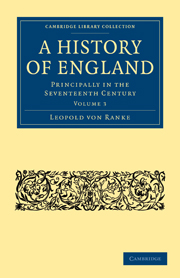Book contents
- Frontmatter
- Contents
- BOOK XI THE COMMONWEALTH IN ENGLAND, 1649—1653
- BOOK XII THE PROTECTORATE OF OLIVER CROMWELL, 1653–1658
- BOOK XIII FALL OF THE PROTECTORATE AND THE COMMONWEALTH. RESTORATION OF THE MONARCHY, 1658—1660
- BOOK XIV THE FIRST FIVE YEARS UNDER CHARLES II. THE RESTORATION OF THE ANGLICAN CHURCH
- BOOK XV THE DUTCH WARS OF CHARLES II. ESTABLISHMENT OF THE PROTESTANT AND PARLIAMENTARY CHARACTER OF THE CONSTITUTION 1664—1674
- INTRODUCTION
- CHAP. I The first war with Holland, in the year 1665
- CHAP. II Influence of France upon the continuation of war and upon the peace
- CHAP. III Fall of the Lord Chancellor Clarendon
- CHAP. IV Convention at the Hague in January 1668. Triple Alliance
- CHAP. V Government and Parliament in the year 1668
- CHAP. VI Secret alliance with France, 1669, 1670
- CHAP. VII Parliamentary sessions from, 1669 to 1671
- CHAP. VIII The second war against Holland, 1672
- CHAP. IX Origin of the Test Act
- CHAP. X Peace with Holland
- CHAP. XI Union of Parliament with the Prince of Orange
CHAP. XII - Movement in literature
Published online by Cambridge University Press: 07 June 2011
- Frontmatter
- Contents
- BOOK XI THE COMMONWEALTH IN ENGLAND, 1649—1653
- BOOK XII THE PROTECTORATE OF OLIVER CROMWELL, 1653–1658
- BOOK XIII FALL OF THE PROTECTORATE AND THE COMMONWEALTH. RESTORATION OF THE MONARCHY, 1658—1660
- BOOK XIV THE FIRST FIVE YEARS UNDER CHARLES II. THE RESTORATION OF THE ANGLICAN CHURCH
- BOOK XV THE DUTCH WARS OF CHARLES II. ESTABLISHMENT OF THE PROTESTANT AND PARLIAMENTARY CHARACTER OF THE CONSTITUTION 1664—1674
- INTRODUCTION
- CHAP. I The first war with Holland, in the year 1665
- CHAP. II Influence of France upon the continuation of war and upon the peace
- CHAP. III Fall of the Lord Chancellor Clarendon
- CHAP. IV Convention at the Hague in January 1668. Triple Alliance
- CHAP. V Government and Parliament in the year 1668
- CHAP. VI Secret alliance with France, 1669, 1670
- CHAP. VII Parliamentary sessions from, 1669 to 1671
- CHAP. VIII The second war against Holland, 1672
- CHAP. IX Origin of the Test Act
- CHAP. X Peace with Holland
- CHAP. XI Union of Parliament with the Prince of Orange
Summary
There was still living the philosopher of the epoch, Thomas Hobbes of Malmesbury, whose incisive sayings had for more than a generation set all minds fermenting. He had formerly devoted himself in Oxford, with as much zeal as any one else, to the scholastic doctrines as they were there taught, but later had entirely put them aside, at first during his travels on the Continent, where he thought he saw that the world was occupied with entirely different problems from those which were proposed in Oxford, and then after his return, by renewed study of the old classical literature, particularly the poets and historians. A decisive influence over his education was exercised by the political occurrences of the time. During many years he enjoyed the peace which Richelieu's supreme authority had produced, and the free literary intercourse which it favoured; he loved the intellectual atmosphere in which strangers moved in Paris. On his return to England, the first outbreak of the civil disturbances, which affected all men's thoughts and actions, terrified him and moved him to return to Paris. Between the opposite impressions of salutary repose under a monarchy, and wild civil war, caused by the attempt to limit the Prince's power, his theory about state power, I will not say originated, because it hangs together with all that he perceived and thought, but at least ripened and attained a form in which it could be expressed.
- Type
- Chapter
- Information
- A History of EnglandPrincipally in the Seventeenth Century, pp. 572 - 594Publisher: Cambridge University PressPrint publication year: 2010First published in: 1875



